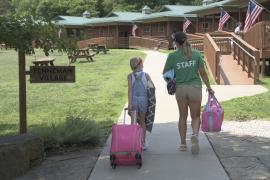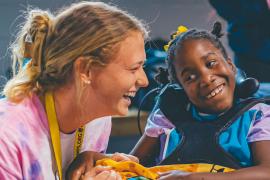How inclusive is your camp? Ask any of your staff and campers that question, and you are likely to get different answers from each one. Why, you might ask? Because at the individual level, the definition of inclusion is how welcome a person feels to be their authentic selves at camp. Without their perspectives, determining how inclusive your camp may be is an exercise in futility.
Diversity and inclusion go hand in hand. A camp can work to diversify its staff in terms of race/ ethnicity, gender, sexual orientation, physical and intellectual disabilities, life experiences, and more. However, efforts to diversify a camp's staff will not be successful if intentional efforts to develop an inclusive culture are not in place. Inclusive cultures do not happen by accident; they are the product of camp leaders' purposeful planning and effort throughout the entire camp process, from hiring to training to the actual camp experience.
Many studies indicate that people decide which jobs to accept, which ones to continue in, and which ones to recommend to others based on an organization's culture; that is, how welcome they feel within the organization. As much of our staff recruitment and retention in camps is based on word of mouth, camps must prioritize developing an inclusive culture.
What Impacts a Camp's Inclusive Culture?
Developing an inclusive culture is more than "check the box" inclusion. Authentic inclusion means that every staff member feels a sense of belonging and acceptance. So what do camp directors and organization leaders do to develop an inclusive culture? Many things are inherent in camps that promote inclusion, but there are always places where we can improve.
Respect
A large part of feeling welcome and included is the feeling that you and your ideas are respected. One of the easiest ways to help facilitate this in the camp setting is to help staff get to know each other beyond the surface level and encourage leaders to spend time with each staff member individually. This is imperative for helping new staff feel welcome, especially if they enter an environment where team members already know each other. It is also essential to recognize the contributions of newer staff members who may have different lived experiences that can contribute to the camp's success in new and different ways.
Fit and Decision-Making
What are you looking for when you hire staff? Do you look for people who are very similar to you and the team you already have? Or do you look for staff that are different and will add diversity to the team? Leaders often look for those that have similar experiences and backgrounds to those already on the team. Rather than hiring for culture fit, leaders should consider hiring for cultural add. Cultural adds will bring creativity and innovation to the team as well as a diversity of thought and ideas. Once you have hired cultural adds, leaders should take extra efforts to ensure that they feel that their views and opinions are included in decision-making processes, even if they are different from those previously presented. To do this, leaders should ask themselves:
- Who is invited to share their ideas? Who else should be asked to share their ideas?
- Whose voices are included in decisions? Do they reflect the diversity of the staff?
- Are conflicting views encouraged? Are all voices encouraged to speak up?
Hiring for cultural add and inclusive decision-making might take some time to implement, especially if it is a cultural shift for your camp. Consider educating your staff on why you are shifting to this process, helping them understand the importance of having a diverse workforce and diverse decision-makers as you develop an inclusive culture at your camp.
Dress Codes
Many of today's dress codes are outdated and not inclusive of the diversity of staff who work at camp. Consider your camp's dress codes:
- Does it impact one gender, ethnicity, or religion more than another?
- Is it written for a specific gender? Could it be updated to focus on articles of clothing instead of gender?
- Are uniforms required? Do they account for differences in gender and body type, or is it one-size-fits-all?
- Are all elements of your dress code necessary?
Many camps and organizations are updating their dress codes to address the issues raised above. Updated dress codes tend to be more general, asking staff to rely on professional judgment and to dress in a way that allows them to complete their work and remain safe while doing so.
Holidays, Celebrations, and Traditions
Camps are known for their rich traditions and celebrations. However, some traditions and celebrations are less than inclusive. Take a look at your camp's traditions and celebrations. Do they reflect your camp's diversity? Are they culturally responsive to the variety within your staff (and campers)? Whose history is celebrated and/or marginalized? Are there updates that would make them more inclusive? Changing tradition can be challenging, but at the same time, staff feeling unincluded can lead to many other problems.
Staff choose to return to camps where they feel welcomed and included. While it takes time to become a genuinely inclusive camp, it also takes time to recruit staff each year. Leaders will find that putting the time into inclusion means spending less time recruiting each year. The change can be incremental; it does not need to happen all at once, and many organizations find that the changes are gradual. As one change is made, the realization of another comes to the surface. Inclusive camps embrace the idea that the change is cyclical and will continue year after year but understand that the process of becoming inclusive is what makes the camp great!
Photo courtesy of YMCA Camp Shady Brook in Deckers, Colorado
This blog was written on behalf of Project Real Job’s efforts to help camps recruit, hire, and retain staff.
Brandon T. Taylor, D Mgt, is an assistant professor, Fresno State Department of Recreation Administration. His background is in community recreation programming and planning for youth and adults, community special-events, and outcome-driven out-of-school-time programming. He has published and presented extensively to municipal and camp organizations on issues related to diversity, equity, and inclusion.
Heather Vilhauer, EdD is an assistant professor in the Department of Hospitality, Recreation and Tourism at Cal State East Bay. Her interests are varied and include youth development and camp administration, leadership and organizational behavior, and issues related to diversity, equity, and inclusion. She spent over 20+ years in the field of recreation and camps working for municipalities, nonprofits, and for-profit organizations.
The views and opinions expressed by contributors are their own and do not necessarily reflect the views of the American Camp Association or ACA employees.




